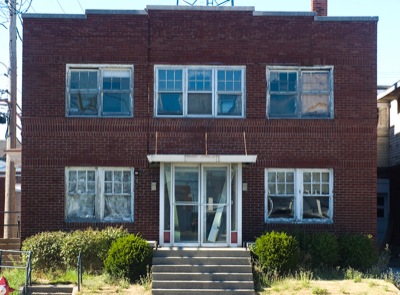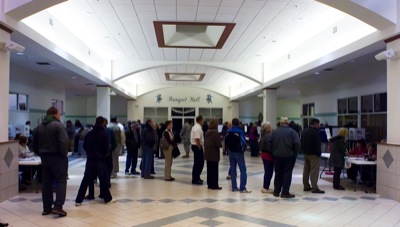Tuesday, November 6th, 2012
Council approves revolving loan for use in demolition
By William Kincaid

Photo by Mark Pummell/The Daily Standard
The demolition of the former Gibbons Hospital on East Fayette Street in Celina is scheduled to begin next week for approximately $109,000. The city is providing Harbor Life Ministries with a $60,000 downtown revitalization grant and a $60,000, zero-interest revolving loan to help raze the hospital and two other blighted buildings.
CELINA - Demolition of the former Gibbons Hospital and surrounding buildings likely will begin next week.
City council members on Monday unanimously approved an ordinance to issue building owner Harbor Life Ministries a $60,000, zero-interest revolving loan to help pay for the removal of the hospital, a nearby caretaker's house and large barn/shed on East Fayette Street. It was passed after council members suspended the rules.
Prior to the special meeting, a brief public hearing was held to entertain discussion on the proposed revolving loan fund application. Only one member from the public, Don Gehle, spoke out against the deal, citing an incorrect address for the hospital was published on a legal brief.
Law director George Moore said the address listing was simply a scrivener's error and state entities involved in authorizing the demolition are cognizant of where the property is located.
In addition to the $60,000 city revolving loan - which must be paid back in full within two years - the city also gave Harbor Life Ministries $60,000 from its second $400,000 Community Development Block Grant to upgrade downtown buildings. The grant requires a 50 percent match, and Harbor Life Ministries will use the $60,000 revolving loan as its match, mayor Jeff Hazel said.
The demolition contract is estimated at $109,000. VTF Excavation of Celina plans to begin work next week. Once completed, the vacant lots will have a gravel stone top.
After issuing the $60,000 loan, the city revolving loan fund balance will be about $22,000, city engineer Kent Bryan said. Those funds came from the state, which always threatens to take the money back if not put to good use, he said.
Normally, revolving loan funds are authorized for the generation of jobs and employment, Hazel said.
"In this case, they (the state) have signed off," Hazel said. "We have that documented ... from the state that they do also allow it to go for slum and blighted areas. So that's allowable for that."
Bryan said the city and the Harbor Life Ministries officials have sought a remedy for the blighted property for five years.
"This represents a formal agreement with the property owners," Bryan said. "It's probably a good compromise for everybody in this. They have an obligation to repay it as a loan, but it gives them the opportunity to get rid of some blighted properties. It adds value to the balance of their property as well as the surrounding downtown area."
Councilwoman Angie King asked what would happen if Harbor Life Ministries doesn't pay back its loan.
Moore said the city will hold a mortgage on the entire quarter block of property owned by Harbor Life Ministries, not just the three buildings to be demolished.
If they default, the city has first claim on the quarter block of property, Hazel added.
Bryan estimates the value of the property, based on tax records, between $300,000 and $400,000.
Officials must preserve key historical elements:
CELINA - The city is working with the Ohio Historical Preservation Office as it prepares to have the former Gibbons Hospital demolished.
Various state-mandated stipulations must be carried out because federal dollars will be used to tear down buildings listed as contributing resources to the Celina Main Street Commercial Historical District. Some of the stipulations include extensive written and photographic documentation of the buildings as well as the removal of any key historical elements, such as the neon hospital entrance sign and wrought iron fire escape.
The sign and any pertinent documents will be donated to the Mercer County Historical Society, and the fire escape will be reused at another downtown location.
After demolition, the city must include the Ohio Historical Preservation Office and the design review board in any review of new construction to make sure the design is compatible with the neighborhood and surrounding National Register historic district. At one time, city officials proposed buying the land and converting the area into a parking lot.
Celina Mayor Jeff Hazel recently dismissed the idea and said a few entities are considering developing the land. However, he would not comment on the possible nature of any development.
- William Kincaid



